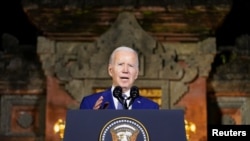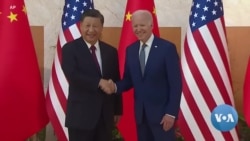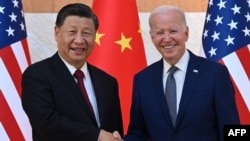U.S. President Joe Biden said Monday that he does not believe China's leaders plan an "imminent" attack on Taiwan, but he said Washington remains committed to maintaining peace in the Taiwan Strait.
"We oppose unilateral change in the status quo by either side, and we're committed to maintaining the peace and stability in Taiwan Strait," said Biden in a press conference in Bali.
Biden, speaking at a news conference after 2 ½ hour talks with China's President Xi Jinping at a resort hotel in Bali, said the United States would "compete vigorously" with China on the world stage, "but I'm not looking for conflict. I'm looking to manage this competition responsibly."
Tensions over Taiwan soared in recent months, with Beijing scrambling fighter jets near Taiwanese airspace and firing missiles into nearby waters protesting a visit to Taipei by U.S. House of Representatives Speaker Nancy Pelosi in August.
The Chinese Ministry of Foreign Affairs said Xi asked Biden to honor his promise that the U.S. does not support Taiwan's independence, nor does the U.S. have any intention to use Taiwan as a tool to contain China.
The Chinese readout said: "It is the common aspiration of the Chinese people to safeguard the unity and territorial integrity of the motherland. Anyone who wants to separate Taiwan from China is against China's national interests. The Chinese people will never agree!"
New cold war?
Trading partners of Washington and Beijing are worried that tensions and a new U.S. semiconductor export ban could force nations to pick sides. Biden tried to reassure them, saying that despite tensions over the Taiwan Strait and other issues, Washington is committed to diplomacy.
"I absolutely believe there need not be a new cold war" with China, Biden said. "I made it clear we want Strait issues to be peacefully resolved."
For decades, the U.S. has been clear that its decision to establish diplomatic relations with China in 1979 rested on the expectation that "the future of Taiwan will be determined by peaceful means," as stipulated in the Taiwan Relations Act.
The United States provides Taiwan with defense equipment under the Taiwan Relations Act.
On Monday, Taiwan's Ministry of Foreign Affairs expressed its appreciation that Biden used the meeting to publicly repeat Washington's commitment to Taiwan's security.
"As a responsible member of the democratic camp in the Indo-Pacific region, Taiwan will continue to actively strengthen its self-defense capabilities, deepen its security partnership with the U.S., and work closely with like-minded countries to jointly fight against authoritarianism, at a critical moment when authoritarian countries are blatantly challenging the international order," said Taiwan's Ministry of Foreign Affairs in a statement.
Open and candid talks
Biden said his talks with Xi were "open and candid" and that the two leaders discussed their countries' "intentions and priorities" on a range of issues.
"I found him direct and straightforward," Biden said of Xi.
Biden said in the press conference that he made clear to Xi that "we'll defend American interests and values, promote universal human rights," and work with U.S. allies and partners.
Biden said he has directed several top U.S. officials to "maintain communication" with their Chinese counterparts. The two leaders also agreed that Secretary of State Anthony Blinken will visit China to follow up on their discussions.
Biden said, "We're not going to be able to work everything out," but he wanted to make sure there was "no misunderstanding about intentions or actions on each of our parts."
On domestic matters, Biden said that the American people in last week's U.S. congressional elections "proved once again that democracy is who we are," with the peaceful, non-violent conduct of voting across the country.
He said the outcome, with Biden's Democrats performing substantially better than pre-election predictions, was a "strong rejection" of Republican candidates who supported former President Donald Trump's contention that Trump was cheated out of another White House term in the 2020 presidential election that Biden won.
Biden characterized the peaceful voting as a "strong rejection of political violence and voter intimidation." He described the outcome as an "emphatic statement that in America the will of the people prevailed."
Biden's Democrats will maintain their slim majority in the Senate when the new Congress is sworn in next January. Political control of the House of Representatives is not yet settled, with Biden expressing doubt that Democrats can overcome a narrow Republican edge as the vote counting continues.
VOA's Ken Bredemeier contributed to this report.








